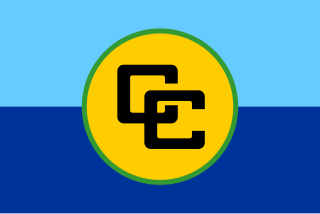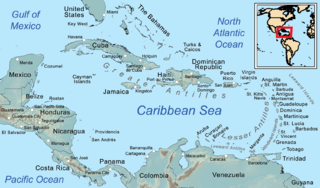The Caribbean Forum (CARIFORUM) is a subgroup of the Organisation of African, Caribbean and Pacific States and serves as a base for economic dialogue with the European Union. It was established in 1992. Its membership comprises the 15 Caribbean Community states, along with the Dominican Republic. [1] In 2008, they signed the CARIFORUM-EU Economic Partnership Agreement with the European Union. [2] Guyana and Haiti expressed reservations and did not attend the signing ceremony. [3]

The Caribbean Community is an intergovernmental organisation that is a political and economic union of 15 member states throughout the Americas and Atlantic Ocean. They have primary objectives to promote economic integration and cooperation among its members, ensure that the benefits of integration are equitably shared, and coordinate foreign policy. The organisation was established in 1973, with its four founding members signing the Treaty of Chaguaramas. Its primary activities involve:
The European Union has a number of relationships with foreign states. According to the European Union's official site, and a statement by Commissioner Günter Verheugen, the aim is to have a ring of countries, sharing EU's democratic ideals and joining them in further integration without necessarily becoming full member states.
A European Union Association Agreement or simply Association Agreement (AA) is a treaty between the European Union (EU), its Member States and a non-EU country that creates a framework for co-operation between them. Areas frequently covered by such agreements include the development of political, trade, social, cultural and security links.

The Cotonou Agreement is a treaty between the European Union and the African, Caribbean and Pacific Group of States. It was signed in June 2000 in Cotonou, Benin's largest city, by 78 ACP countries and the then fifteen Member States of the European Union. It entered into force in 2003 and was subsequently revised in 2005 and 2010.

The Organisation of African, Caribbean and Pacific States is a group of countries in Africa, the Caribbean, and the Pacific that was created by the Georgetown Agreement in 1975. Formerly known as African, Caribbean and Pacific Group of States (ACP), the organisation's main objectives are sustainable development and poverty reduction within its member states, as well as their greater integration into the world's economy. All of the member states, except Cuba, are signatories to the Cotonou Agreement with the European Union.
Economic Partnership Agreements (EPAs) are a scheme to create a free trade area (FTA) between the European Union and other countries. They are a response to continuing criticism that the non-reciprocal and discriminating preferential trade agreements offered by the EU are incompatible with WTO rules. The EPAs date back to the signing of the Cotonou Agreement. The EPAs with the different regions are at different states of play. The EU has signed EPAs with the following countries: the Southern African Development Community (SADC), ECOWAS, six countries in Eastern and Southern Africa, Cameroon, four Pacific states, and the CARIFORUM states. Their defining characteristic is that they open up exports to the EU immediately, while exports to the partner regions is opened up only partially and over transitioning periods.

Development cooperation between the European Union (EU) and the countries of the African, Caribbean and Pacific Group of States (ACP) started in 1957 with the Treaty of Rome, which first established a collective European development policy. The Treaty of Rome granted associated status to 31 overseas collectivities and territories (OCTs) and provided for the creation of a European Development Fund (EDF) intended to grant technical and financial assistance to the countries which were still under European rule at the time. More significantly, however, by means of the Treaty of Rome the six member states of the European Economic Community were expressing solidarity with the colonies and OCTs and committed themselves to contribute to their prosperity. The EDF has to date been funded outside the EU budget by the EU Member States on the basis of financial payments related to specific contribution shares, or “keys”, which are subject to negotiation. The EDF is currently the only EU policy instrument that is financed through a specific key that is different from the EU budget key, and which reflects the comparative interests of individual Member States.

The ACP–EU Joint Parliamentary Assembly was created to bring together the elected representatives of the European Union and the elected representatives of the African, Caribbean and Pacific states that have signed the Cotonou Agreement.

This article deals with the diplomatic affairs, foreign policy and international relations of Barbados.

The Caribbean is a subregion of the Americas that includes the Caribbean Sea and its islands, some of which are surrounded by the Caribbean Sea and some of which border both the Caribbean Sea and the North Atlantic Ocean; the nearby coastal areas on the mainland are often also included in the region. The region is southeast of the Gulf of Mexico and the North American mainland, east of Central America, and north of South America.

Barbadian–German relations are foreign relations between Barbados and Germany. Barbados is represented in Germany through its embassy in Brussels, (Belgium) and Germany is represented in Barbados from its regional embassy for the Eastern Caribbean in Port of Spain, and an Honorary Consul in Christ Church. Barbados and Germany formally established diplomatic relations on 14 March 1967.

Barbadian-French relations are the bilateral relations between the two countries, Barbados and France. Both countries have established diplomatic relations on May 3, 1968. Barbados is represented in France through its embassy in Brussels (Belgium). France is represented in Barbados through its embassy in Castries, led by and an additional honorary consulate in Bridgetown.

The European Union has concluded free trade agreements (FTAs) and other agreements with a trade component with many countries worldwide and is negotiating with many others. The European Union negotiates free trade deals on behalf of all of its member states, as the member states have granted the EU has an "exclusive competence" to conclude trade agreements. Even so, member states' governments control every step of the process :

A member state of the Caribbean Community is a state that has been specified as a member state within the Treaty of Chaguaramas or any other Caribbean state that is in the opinion of the Conference, able and willing to exercise the rights and assume the obligations of membership in accordance with article 29 of the Treaty of Chaguaramas. Member states are designated as either More economically developed country (MDCs) or Less economically developed countries (LDCs). These designations are not intended to create disparity among member states. The Community was established by mainly English-speaking Caribbean countries, but has since become a multilingual organisation in practice with the addition of Dutch-speaking Suriname in 1995 and French-speaking Haiti in 2002. There are fifteen full members of the Caribbean Community, four of which are founding members.
Commonwealth free trade is the process or proposal of removing barriers of trade between member states of the Commonwealth of Nations. The preferential trade regime within the British Empire continued in some form amongst Commonwealth nations under the Imperial Preference system, until that system was dismantled after World War II due to changes in geopolitics and the pattern of global trade, and the United Kingdom's entry into the European Economic Community. The idea of promoting renewed inter-Commonwealth trade emerged in the late 20th century as a response to the evolution of the global economy. At one extreme, proposals have been raised for the creation of a multilateral free trade area comprising all member states of the Commonwealth of Nations.

The Eurosphere or the European Empire is a concept associated with the public intellectual Mark Leonard, Oxford University academic Jan Zielonka, the European Union Director-General for Politico-Military Affairs Robert Cooper and the former European Commission President José Manuel Barroso.

Following its withdrawal from the European Union on 31 January 2020, the United Kingdom began negotiations on several free trade agreements to remove or reduce tariff and non-tariff barriers to trade, both to establish new agreements and to replace previous EU trade agreements. Withdrawal ended 47 years of membership during which all its trading agreements were negotiated by the European Commission on behalf of the bloc. The UK did not actually withdraw from the European Single Market and the European Union Customs Union until 31 December 2020.